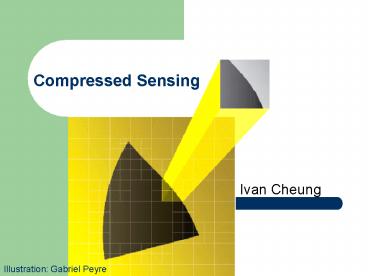Compressed Sensing PowerPoint PPT Presentation
1 / 15
Title: Compressed Sensing
1
Compressed Sensing
- Ivan Cheung
Illustration Gabriel Peyre
2
Overview
- What is compressed sensing?
- How it works
- Applications
3
What is compressed sensing?
- A paradigm shift that allows for the saving of
time and space during the process of signal
acquisition, while still allowing near perfect
signal recovery when the signal is needed
Image Windows Vista
4
Sparsity
- The concept that most signals in our natural
world are sparse
Diagram Emmanuel Candès, Michael Wakin
5
How It Works
1) Undersample A camera or other device captures
only a small, randomly chosen fraction of the
pixels that normally comprise a particular image.
This saves time and space.
Photos Corbis Image Simulation Jarvis
Haupt/Robert Nowak
6
How It Works
2) Fill in the dots An algorithm called l1
minimization starts by arbitrarily picking one of
the effectively infinite number of ways to fill
in all the missing pixels.
Photos Corbis Image Simulation Jarvis
Haupt/Robert Nowak
7
How It Works
3) Add shapes The algorithm then begins to modify
the picture in stages by laying colored shapes
over the randomly selected image. The goal is to
seek sparcity, a measure of image simplicity.
Photos Corbis Image Simulation Jarvis
Haupt/Robert Nowak
8
How It Works
4) Add smaller shapesThe algorithm inserts the
smallest number of shapes, of the simplest kind,
that match the original pixels. If it sees four
adjacent green pixels, it may add a green
rectangle there.
Photos Corbis Image Simulation Jarvis
Haupt/Robert Nowak
9
How It Works
5) Achieve clarityIteration after iteration, the
algorithm adds smaller and smaller shapes, always
seeking sparsity. Eventually it creates an image
that will almost certainly be a near-perfect
facsimile of a hi-res one.
Photos Corbis Image Simulation Jarvis
Haupt/Robert Nowak
10
Applications
- Medical
- Fast MRI Imaging
- Artificial Intelligence
- Baysian classifier
- Facial recognition
- OCR
11
Applications
- Distributed Networks
- Data storage
- Error correction codes
- Sensor networks
- Signal detection
12
Sensor Networks
- A typical wireless sensor network contains a
large number of wireless sensor nodes, which
gather information and deliver it to a distant
destination, termed a fusion center, where
information is filtered and aggregated.
Diagram Jarvis Haupt, Robert Nowak
13
Sensor Networks
- processing and communication are combined into
one distributed projection operation - it virtually eliminates the need for the sensor
network to process and communicate - consistent signal estimation is possible with
power and latency requirements growing
sub-linearly in relation to the number of sensor
nodes
14
Sources
- Candès , Emmanuel J. and Michael B. Wakin. "An
Introduction to Compressive Sampling." IEEE
Signal Processing Magazine (March 2008) 21-30. - Candès , Emmanuel J. and Paige A. Randall.
"Highly Robust Error Correction by Convex
Programming." IEEE Signal Processing Magazine
(July 2008) 2829-2840. - Ellenberg, Jordan. "Fill in the Blanks." Wired,
March 2010, 62-67. - Haupt, Jarvis, Waheed U. Bajwa, Michael Rabbat,
and Robert Nowak. "Joint Source-Channel
Communication for Distributed Estimation in
Sensor Networks." IEEE Transactions on
Information Theory (October 2007). - Haupt, Jarvis, Waheed U. Bajwa, Michael Rabbat,
and Robert Nowak. "Compressed Sensing for
Networked Data." IEEE Signal Processing Magazine
(March 2008) 92-101. - Rudelson, Mark, Roman Vershynin. "Geometric
Approach to Error-Correcting Codes and
Reconstruction of Signals." International
Mathematics Research Notices (2005). - "Wikipedia." Wikimedia Foundation.
http//en.wikipedia.org/wiki/Compressed_sensing
(accessed April 9, 2010).
15
Thank You!
- Questions?

